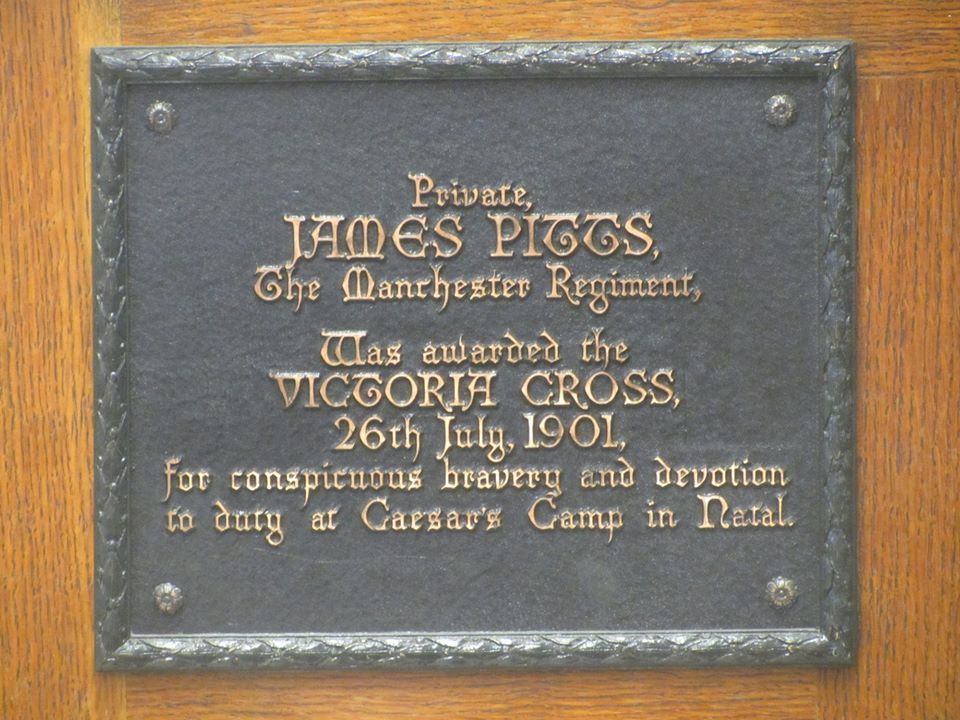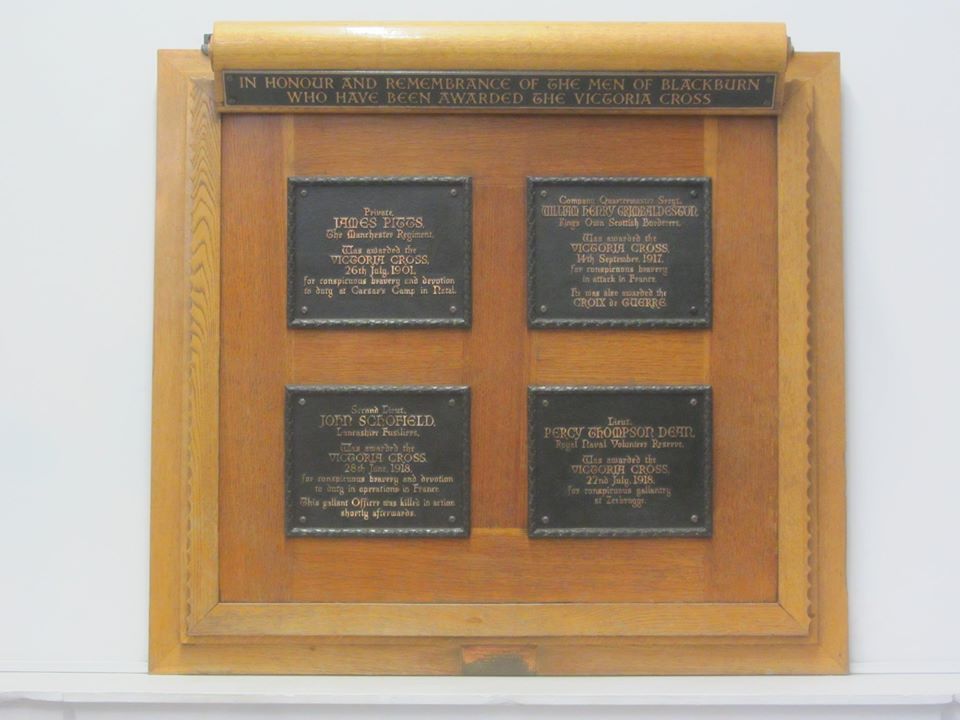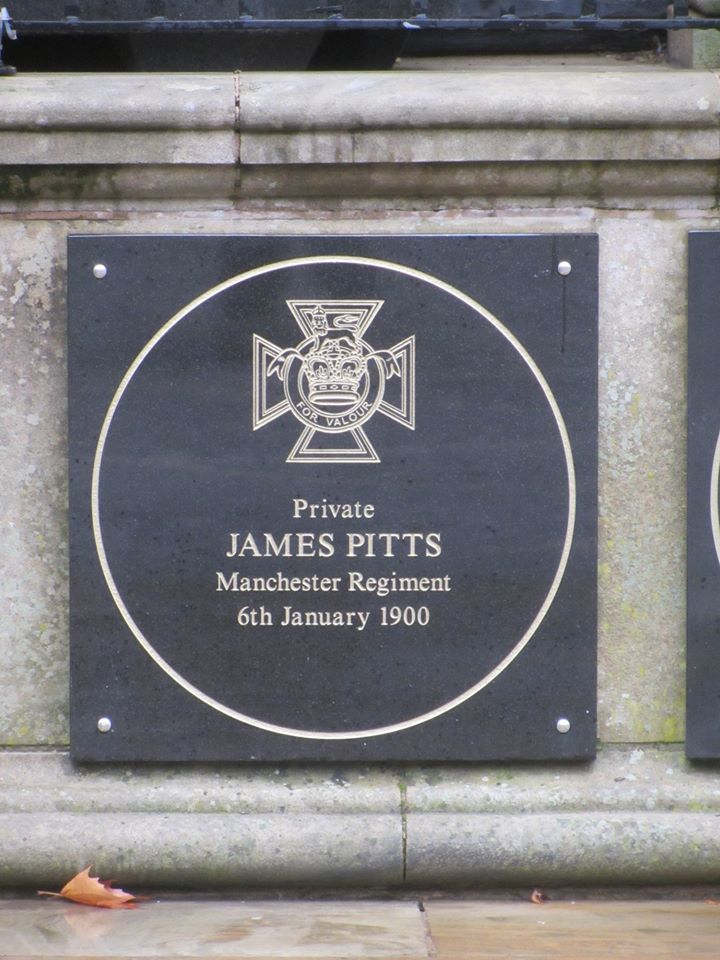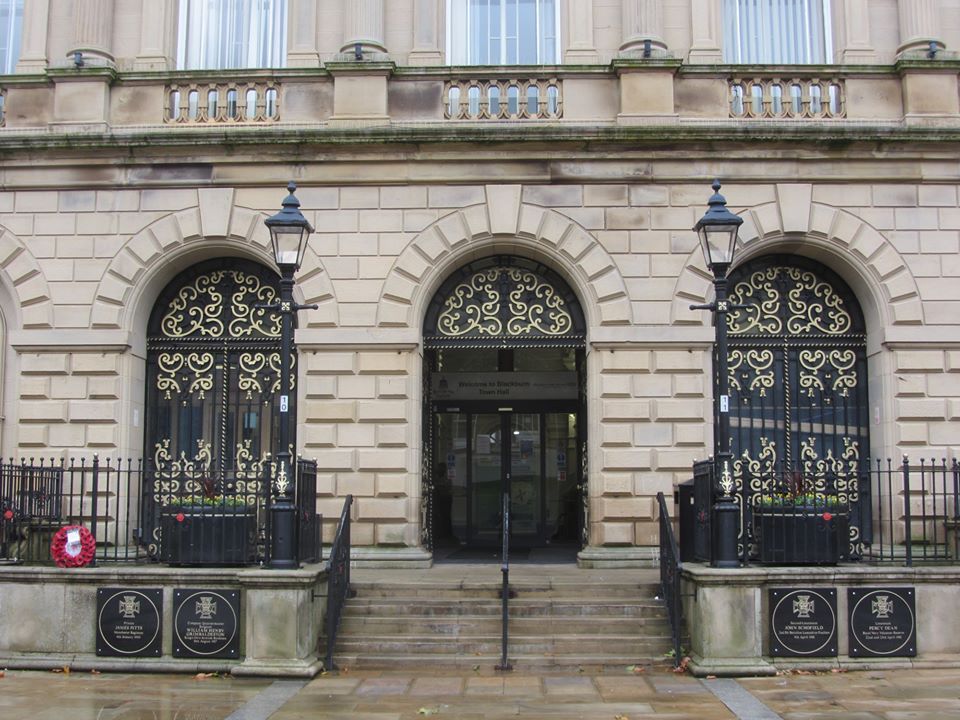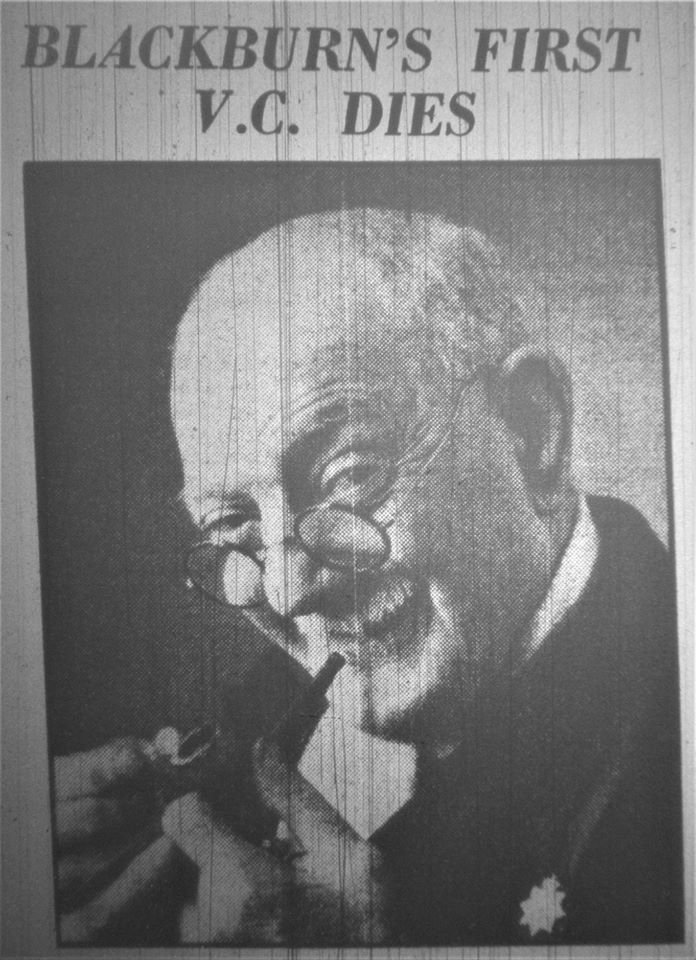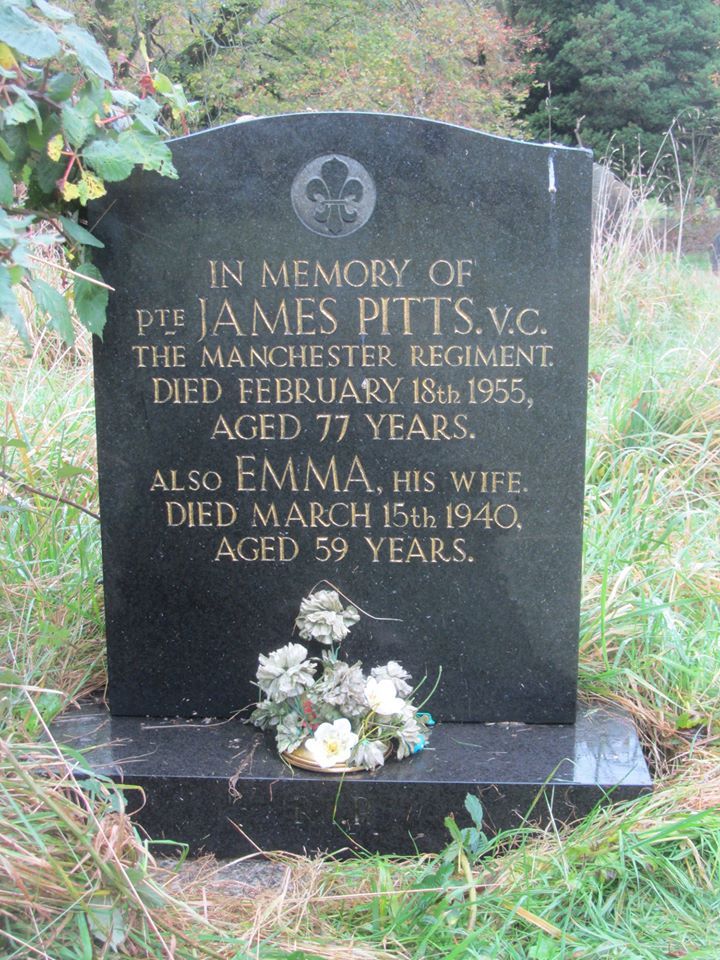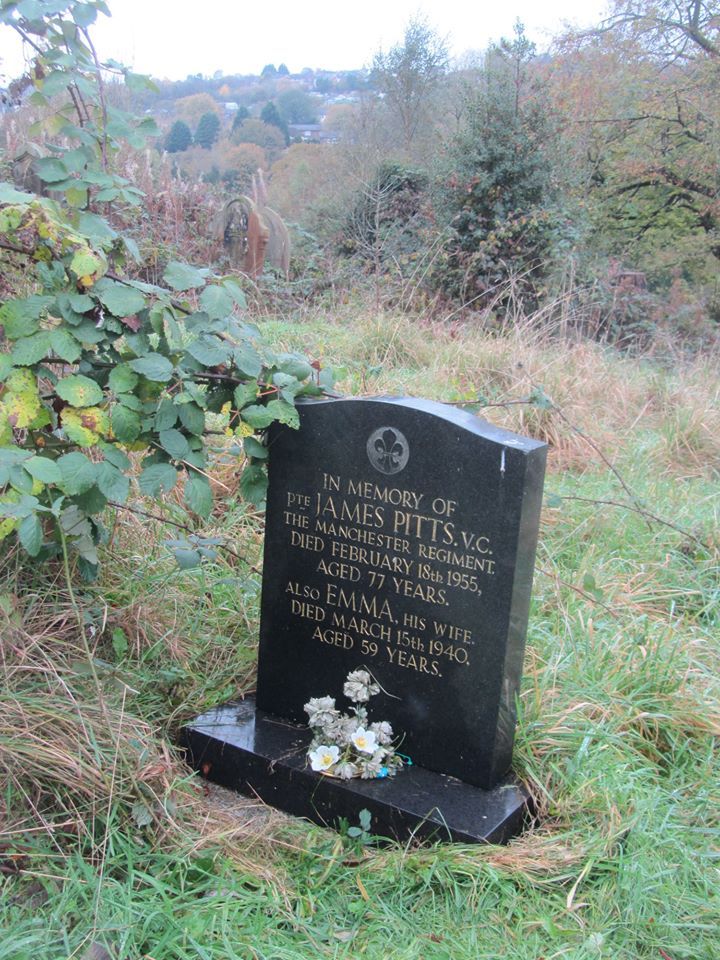|
Welcome,
Guest
|
TOPIC:
Private James Pitts V.C., 1st Manchester Regiment 5 years 7 months ago #70347
|
Inside Blackburn Town Hall.
Outside Blackburn Town Hall. This VC memorial paving stone was unveiled on the 31st of May, 2019, and accompanies Blackburn's three WW1 VC holders - from left: James Pitts, William Henry Grimbaldeston, John Schofield, Percy Thompson Dean. Paving stones to commemorate Britain's WW1 VC holders were funded by the Government as part of the remembrance of the end of the war, Blackburn's being the only ones I've seen that aren't laid flat. James Pitts' stone was funded by Blackburn Council. www.lancashiretelegraph.co.uk/news/17678...rn-town-hall-plaque/ (You'll need to 'accept cookies' to be able to read the article and see a photo of James Pitts holding his medals)
BLACKBURN'S FIRST V.C.
THE DEFENDERS OF CÆSAR'S CAMP.
PRIVATE PITTS TO BE DECORATED.
….It was notified in last night's "Gazette" that the King has been pleased to signify his intention to confer the Victoria Cross upon Private R. Scott and J. Pitts, of the 1st Battalion Manchester Regiment, for conspicuous bravery, thus officially described. During the attack on Caesar's Camp, Natal (Ladysmith) on the 6th January, 1900, these two men occupied a sangar on the left of which all our men had been shot down and their position occupied by Boers, and held their post for 15 hours without food and water, all the time under an extremely heavy fire, keeping up their fire and a smart look-out, though the Boers occupied some sangars on their immediate left rear. Private Scott was wounded.
….Private Pitts' parents live in New Water-street, Blackburn. It will be remembered that Sir George White, who so gallantly defended Ladysmith, made special mention of these two brave fellows in his speech at Capetown. The Ladysmith correspondent of the "Manchester Guardian," who interviewed the men, thus wrote of the Blackburn hero: - "The first of the two whom I met was Private James Pitts, of D Company. He was a man of medium height with brown eyes and hair, and a pronounced Lancashire accent. He hails from Blackburn, and has just been four years in the regiment, so he told me. He proved a shy person of a retiring disposition, and I found it difficult to coax from him any of his personal impressions of the fight; modesty in a brave man is a quality of all excellence, but it is a hindrance to the inquiring correspondent. He began firing, he told me, about 3 30 a.m., and his picket was on its own resources till the afternoon, when the Rifle Brigade came up (they were firing in the rear of him some time earlier had he known it). The range was amazingly short. The Boers were, he said, within 16 yards of him, and it was death to appear over the rock. 'Had you anything to eat?' 'Didn't feel like eating, sir,' was the answer, 'but I had plenty of water, and was glad of it.' For the rest, he seems to have little idea of what was to be the upshot of the matter. He had water and cartridges whence he got them you will hear later, and it was his duty to stick to his rock and his rifle, which he did." He got his cartridges and his water as a matter of fact from his dead comrades. Pitts and Scott were the sole survivors of the gallant little band. Scott is a Haslingden man. The Blackburn Times, Saturday 27th July 1901
________________________________________________
PRIVATE PITTS, V.C., HOME AGAIN.
RECEPTION AT THE RAILWAY STATION.
A BRAVE SOLDIER'S HEROIC STAND.
THE STORY OF CAESAR'S CAMP RETOLD.
….Nearly two years have elapsed since the long-drawn out war in South Africa came to an end, and yet it was not until last Saturday that Private James Pitts, whose proud distinction it is to be the only Blackburnian who has won the Victoria Cross, returned home. So long had his home-coming been delayed that people had ceased to talk of him. He was almost forgotten, except, of course, by his own immediate kith and kin; and, perhaps, the chums of his boyhood. This, at all events, seems to be a reasonable explanation why one rightly designated a hero was allowed to slip home practically unobserved. Of his coming no-one was aware until a few hours before his arrival, when the brief telegram, "Will arrive eight o'clock. - Jim," reached his father. Thus it happened that no official welcome awaited the hero of Caesar's Camp, no bands of music played him home, no crowd thronged the street, eager for a glimpse of the face of the gallant soldier, or to cheer him in that lusty fashion so great a characteristic of Lancashire people. No; when Private James Pitts, V.C., stopped out of the train shortly after eight o'clock last Saturday night the only person who recognised him was a chum, who had succeeded in getting on the platform, whilst his younger brothers, Hugh and George, waited for him at the ticket gate in the entrance hall. Once outside the station exit, however, he was joined by more of his companions, who rushed up to shake hands and in honest if blunt Lancashire fashion to express their pleasure at seeing him once again. When the public thoroughfare had been gained someone spotted the bronzed, soldierly-looking young man, accompanied by chattering companions, one of whom carried a tin box, and called out "Give him a cheer. Hooray!" "Hooray!" responded a score of voices in chorus. And with this welcome Private Pitts passed on and was soon in Water-street and within a few yards of his home. The neighbours having heard of his expected arrival put out their colours and streamers of bunting prepared to give him a hearty welcome. Had it not been too dark Private Pitts would have read such greetings as "Welcome" and "Welcome Home our V.C. Hero." The crowd gathered in front of No. 20, the home of Private Pitts, opened right and left. A few short, quick strides, Pitts was down the ranks, had crossed the threshold, and rejoined the family circle which he had left five years before.
Private Pitts's Army Career. ….Private James Pitts, is the eldest son of Patrick Pitts, an umbrella maker, of 20, Water-street, Blackburn. He was born on February 26th, 1878, at 33, Barton-street, an exterior view of which house is reproduced here. James attended St. Anne's Roman Catholic School up to being 13 years of age, when he went to the mill to learn weaving. He worked at the loom up to 18 years of age, then he took the Queen's shilling and exchanged his civilian clothes for the uniform of a British soldier. He joined the 1st Battalion of the Manchester Regiment at the Ashton depot on March 20th, 1896. Here he remained for the recruit's probationary term of two months. On May 21st he was sent to join his regiment then stationed at Aldershot. In November, 1897, the regiment sailed for Gibraltar for garrison duty on that impregnable rock. Thus Private Pitts passed the first three years of his life as a soldier during which time he paid three visits to his home in Blackburn. Towards the end of the summer of 1899 the British garrison at Gibraltar became aware that some important military movement was going on in South Africa, and it was no surprise, therefore, to Private Pitts and his comrades of the Manchesters when the order came for them to sail at once for the Cape. They embarked on August 24th and upon reaching the Cape were immediately sent up country to Pietermaritzburg to relieve the Dublins. About 6,000 troops were encamped there and they knew that the situation was considered critical and that war was not altogether unexpected. It is not our purpose to give even a brief sketch of that war, but it will be necessary to refer to various incidents in the campaign in order to complete the story of Private Pitts' career. Indeed, had there been no war there would have been no Private Pitts, V.C., for it was on the battlefield in South Africa, where lie the bodies of so many thousand British soldiers, the scene of so many heroic deeds, that Private Pitts showed his pluck, endurance and loyalty, and upheld the honour of the British flag. His Baptism of Fire. ….Three weeks later the Manchesters marched out of Pietermaritzburg for Ladysmith. When they departed from the capital of Natal it was understood that the entire distance had to be accomplished on foot, which would have meant a seven days' march. However, at the end of the second day the news was so ominous that they were hurried forward by rail and thus were enabled to reach Ladysmith before the outbreak of hostilities and the investment of the town, which lasted 120 days. The Boers fired the first shot on October 11th, and on the 21st of that month the battle of Elandslaagte was fought. There Private Pitts received his baptism of fire. Like many another soldier who goes into action for the first time, Private Pitts, when interviewed at his home on Monday and invited to describe his feeling when under fire, expressed himself as unable to do so. The excitement within and without was very great, and that was all he could say. On the morning of the battle the Manchesters were awakened about three o'clock and half the battalion, including Private Pitts, were sent with other troops in an armoured train some few miles out of Ladysmith. The Boers were found to be strongly entrenched and they opened fire on the British, who were compelled to retire a few miles pending the arrival of the artillery. The desultory firing lasted throughout the morning but at half-past three, whilst the Devons held the enemy's front, the Manchesters and Gordons turned the left flank. When the charge had been sounded up went the Gordons with one British cheer, followed closely by the Manchesters. Strongly as the enemy were entrenched on the steep stone kopje they were driven out at the point of the bayonet, and by half-past six the British had gained a notable victory. Darkness fell like a pall over the hillside on which, throughout the night, the victorious troops tried to get some rest. But not a bit of sleep was to be theirs. The moans of the wounded, who could not be removed until daybreak, the rain and the cold, made sleep impossible. Thus was Private Pitts's first experience of the real horrors and hardships of war. Story of a Noble Stand. ….The scene is changed. On yonder hill a little band of 16 men lie. They are not sleeping, although the hour is but three a.m. They prick their ears; they peer through the darkness. Each grips his rifle, for they are British soldiers. What are they doing there? They know not. All that they know is that they are wanted there, and there they must remain. Caesar's Camp, the hill of which we write, is about three miles south of Ladysmith, and on the 6th of January, 1900, was made one of the chief points of attack by the Boers. the remote position held by this little band was the most advanced post occupied by any of the Ladysmith garrison and the key of the position. Darkness gives place to dawn, and with the first streaks of light the enemy is seen advancing. The Boers steal with stealthy tread up the sides of the hill, seeking cover where they can. The game is one of patient watching and waiting. A flash, a report; and one of the kharki-clad band of 16 rolls over dead. He had been too venturesome. He had raised his head ever so little above the stone wall - his fortress, his castle, built by his own hands, for his own protection - the watchful enemy had noticed it and taken deadly aim. Rifle shot answers rifle shot, and one after another the little band is reduced. All the long morning the battle wages. At high noon the fierce rays of the sun beat down upon the handful still holding the "fort." The stern wrestle of death goes on. Darkening clouds begin to gather, and at three in the afternoon the storm bursts. The rain descends with torrential force, the lightning flashes, the thunder peals, but the expected relief is not yet. Without food, almost without water, these men are glad of the rain drops with which to wet their parched tongues. The storm passes. Now there are only two of the 16 left - Private Pitts, of Blackburn, and Private Scott, of Haslingden. Still they hold the rock. Scott is wounded near the ear, but he grips his rifle. The pair are now driven to using the bullets out of their dead comrades' pouches. Night has again come round, relieved at last the two survivors are taken back into Ladysmith to learn for the first time that their stern trial of endurance, of resolution and of staying power, has saved a tactical position of immense value. Each man has won the Victoria Cross. Praised by Sir George White. ….Sir George White, the saviour of Ladysmith, referred in his speech at Capetown, before he sailed for home, to the incident just related: "On that day sixteen of the Manchester Regiment, without any officers to guide or direct them, held a remote position at Caesar's Camp from 3 o'clock in the morning till nightfall. When the Devonshires reinforced the fighting line at that point, and the enemy were repulsed, it was found that fourteen of these brave men were lying dead, another was wounded, and only one remained unscathed." This was Private Pitts, of Blackburn, subsequently interviewed by the "Manchester Guardian" correspondent who wrote "he was a man of medium height with brown eyes and hair, and a pronounced Lancashire accent. He hails from Blackburn, and has just been four years in the regiment, so he told me. He proved a shy person of a retiring disposition, and I found it difficult to coax from him any of his personal impressions of the fight; modesty in a brave man is a quality of all excellence, but it is a hindrance to the inquiring correspondent. He began firing, he told me, about 3-30 a.m., and his picket was on its own resources till the afternoon, when the Rifle Brigade came up (they were firing in the rear of him some time earlier had he known it). The range was amazingly short. The Boers were, he said, within 16 yards of him, and it was death to appear over the rock. 'Had you anything to eat?' 'Didn't feel like eating, sir,' was the answer, 'but I had plenty of water, and was glad of it.' For the rest, he seems to have little idea of what was to be the upshot of the matter. He had water and cartridges whence he got them you will hear later, and it was his duty to stick to his rock and his rifle, which he did." He got his cartridges and his water as a matter of fact from his dead comrades. A Comrade's Version. ….Private Scott, who was also interviewed by the same correspondent, was a little more communicative. He said, "Very early in the night he thought that all was over. The left of the line was gone, the Boers were advancing so that nothing could stop them, and he fully expected a rush which would result either in his death or capture. After a time, however, he discovered that the Boer leaders were in difficulties as great as those of our own people. they could not get their men to come up. He could hear the commandant, a brave man, whoever he was, urging and calling on his men to come forward and sweep away the little handful of Manchesters who still clung to the crest; but exhortations were to little purpose - the rank and file of the Boers hung back. How had he managed about ammunition? 'There were two of our men lying dead in the sangar with me and Pitts, and we helped ourselves to their cartridges. I hung on," continued Scott, "without seeing any sign of reinforcements, and indeed without hope of any.' (He, therefore, was likewise too busy to notice the Rifle Brigade lying a bit in rear of him.) 'I got up to look up for reinforcements and was at once struck in the face by several splinters, so I had to duck down again.' Just before this Pitts and Private Murphy, one of the men from whom they subsequently got ammunition, had also stood up for a moment, and Murphy had been instantly killed. Scott warned Pitts to be careful. After a minute or two Pitts moved again, ever so little. This was enough for the watchful Boer who had slain Murphy; he showed himself just for a moment. Scott shot him dead, and he rolled down the hill. Their comrade was avenged." Decorated with the V.C. ….For seven weeks longer the siege continued, and during that period the beleagued garrison made several sorties. Private Pitts speaks of the weeks he was shut up there in the same modest manner as he does of the episode already referred to. He admitted, however, that his food was half a pound of meal per day, made into biscuits, and that they supplemented their meat rations by horses and mules. After the relief of the town on February 28th, Pitts and others of the garrison were sent to Surprise Hill to recuperate, and at the beginning of May he was in hospital for a short time only. On May 18th the Manchesters left to rejoin General Buller's force, which had commenced to advance. They came up with the fighting line two days later, and remained with the column until after the battle of Belfast in August. Then half the Manchesters were left behind in the Lydenburg district, where there was a good bit of skirmishing to be done. Finally he reached Pretoria, and on Peace Sunday, June 6th, 1902, in the presence of the massed troops Private Pitts was decorated with the Victoria Cross by Lord Kitchener, the then Commander-in-Chief of the field forces. The official statement of the victorious deed, which accompanied the intimation that the King had conferred the V.C. on Privates Pitts and Scott, was as follows: …."During the attack on Cæsar's Camp these two men occupied a sangar on the left of which our men had been shot down, and their positions occupied by the Boers. Scott and Pitts held their posts for fifteen hours without food or water, all the time under an extremely heavy fire, keeping up their fire and a smart look out, though the Boers occupied some sangars on their immediate left rear." ….It is a remarkable fact that though he was in the field from the beginning to the end of the campaign Private Pitts came through unscathed; and with the one exception when he was laid up with enteric in Middelburg Hospital soon after the relief of Ladysmith, he had good health notwithstanding that he was in a part of the theatre of war where the troops suffered great privations. ….When South Africa had no longer any need of them, the Manchester regiment were sent to Singapore. It was thought at one time that the war in the Far east might delay the return of men out there who were due to come home this year. Happily for Private Pitts he was not kept, and, along with about 1,000 other time-expired men, he sailed in the Dilwana on January 26th. The vessel reached Southampton last Thursday. Leaving his tin trunk, which contained among other things his V.C. and two other war medals and bars of which he has three, to be sent on later, he proceeded at once to the depot at Gosport, exchanged his uniform for civilian clothes, and on Saturday was free again to come home, which he lost no time in doing. He has served eight years with the colours, but he has still four to do with the reserve. He receives of course his pension as a private in addition to the £10 a year, paid quarterly, which the V.C. carries with it. He has also £50 which was subscribed by the public of Blackburn. When the fund was closed in January, 1902, the then Mayor (Sir Harry Hornby) invested the sum in Corporation Stock, retaining the scrip, which will now be handed to Private Pitts. The income from this investment is 30s. a year. Origin of the V.C. ….For the origin of the V.C. we have to go back to the days of the Crimean War. It was instituted by Royal Warrant on the 29th of January, 1856, as a reward for individual instances of merit and valour in the Army and Navy. The medal is a little Maltese Cross made of cannon captured from the Russians at Sebastopol. It has the Royal Crest in the middle, and below the words "For Valour." In the centre of the reverse side the date of the act of valour is inscribed, and on the bar, to which the ribbon is attached, the name of the individual and of the corps to which he belongs. On this bar also is engraved a sprig of laurel, and the bar is attached to the Cross with a letter V or a red or blue ribbon according to the service in the Army or Navy of the recipient. The Blackburn Times, Saturday 12th March 1904
________________________________________________
….Private James Pitts, a Blackburn lad, who won the Victoria Cross in the Boer war for a conspicuous act of bravery, returned home on Saturday night and met with a hearty welcome from a large number of his fellow townsmen. This is Pitts' first visit to his relatives since the war and he returns as a time-expired soldier, having served eight years with the colours, during which period he has only been in Blackburn once. He was born in Blackburn in 1878, and is the son of Patrick Pitts, an umbrella maker, of Water-street. He enlisted at the age of 18 in the Manchester Regiment, and served through the South African campaign without a scratch. Pitts won his Victoria Cross at Caesar's Camp, Ladysmith, on January 6th, 1900. A picket of 16 men of the Manchester Regiment held an outlying post from three o'clock in the morning until nightfall. When the position was reinforced by the Devonshire Regiment it was found that no less than 14 out of the 16 were lying dead. Private Scott, of Haslingden, was wounded, and the 16th man, Pitts, was the only man unhurt. For 15 hours this band of heroes maintained their position in face of a large Boer force. Both Pitts and Scott were decorated with the Victoria Cross for their bravery. When the news came to hand in Blackburn a fund was opened in the town and when it reached £50 the Mayor invested the sum in the purchase of Corporation stock, the scrip for which will be handed over to Private Pitts. Since the war Pitts has been stationed at Singapore. The Blackburn Weekly Standard, Saturday 12th March 1904
________________________________________________
….Blackburn's first and oldest V.C., Mr. James Pitts, 41, Duckworth-street, died in the Infirmary on Friday, aged 77. ….Mr. Pitts won his V.C. in the Boer War, at Ladysmith on January 6, 1900. Then Private Pitts, he was one of sixteen men of the Manchester Regiment who defended Caesar's Camp, an outpost of Ladysmith, against a large number of Boers. ….Fourteen of Private Pitts' comrades were killed, the only other survivor of the action, which probably saved Ladysmith, being Private Robert Scott of Haslingden. These two held out for the final 15 hours without food or water. ….Mr. Pitts received his award the day the war ended, June 6, 1902. Lord Kitchener, commander-in-chief of the troops in the field, made the investiture at Pretoria before massed troops. ….After the South African campaign Mr. Pitts was awarded the Meritorious Service Medal, in 1937 he received the Coronation Medal and the following year he was presented to the King and Queen when they visited Blackburn. ….In 1953 Mr. Pitts was unable through illness to accept an invitation to London for the Coronation festivities, but twelve months ago when illness prevented him from attending a reunion at the Ladysmith Ball, Ladysmith Barracks, Ashton-under-Lyne, the Manchester Regiment arranged for Mr. Scott to be brought to Blackburn and the two veterans met for the first time for 28 years. ….Mr. Pitts, who was employed by Blackburn Highways Department until retiring in 1942, was a widower, his wife having died in 1951.
REGIMENT'S TRIBUTE.
….At the funeral at Blackburn Cemetery on Tuesday, riflemen of the Manchester Regiment from Ladysmith Barracks, Ashton-under-Lyne, fired a salute over the grave, and N.C.O.s acted as bearers. After the salute a bugler sounded the Last Post and Reveille.
….The funeral was also attended by officers of the 8th and 9th battalions of the regiment under the command of Major J. T. H. Gunning. The service was conducted by Father G. Duffy, of St. Anne's. ….Among others at the funeral was Alderman E. Porter, an old friend and colleague representing the General and Municipal Workers' Union. ….Wreaths were received from Brigadier Churchill and all ranks of the Manchester Regiment, the regimental Old Comrades' Association, the Sergeants' Mess, Depot, Manchester Regiment, all ranks of the 8th (Ardwick) Battalion, the T.A. Manchester Regiment, Blackburn and District Disabled Ex-Servicemen's Association and Ald. Edward Porter.
______________
AROUND THE TOWN
With RAMBLING ROBIN
….It is just eight days short of 51 years ago (coincidentally it was as this year, Saturday, March 5) that Private James Pitts made a belated return to Blackburn after winning the Victoria Cross four years previously at besieged Ladysmith during the South African War, but my former Editor, Mr. Tom Shaw, then a reporter on The Blackburn Times, remembers the occasion as if it were yesterday.
….Mr. Pitts' home was then in Water-street, in a row of cottages since demolished. When he won his award he was not sent home to receive it at Buckingham Palace. That would have taken far too long in that pre-flight age. Instead Lord Kitchener pinned it on his chest at a regimental parade at Pretoria on Peace Sunday, 1902. ….The war and further foreign service delayed his return to Blackburn until late that Saturday night in 1904. Water-street had been decorated for the occasion and the neighbours gave a right royal welcome to the town's first V.C. ….At nine o'clock on Monday morning Mr. Shaw was back at his house. The rejoicings had calmed down and it was a very modest Mr. Pitts from whom the reporter had to drag the personal story of the feat which won him his decoration. V.C.'s dilemma. ….Then came the question of a photograph. Mr. Pitts didn't have one. Eventually he was prevailed upon to visit the studio of Mr. Fred Sharples in Limbrick. Mr. Shaw hastened in front to make the necessary arrangements, afraid that unless everything was ready the shy hero would back out. ….When he eventually arrived photographer and reporter spotted a snag. The man who had served his country so well had been sent into civilian life without a collar. In those days a badly-fitting suit and a scarf were thought to be good enough for the old soldier. ….As gently as he could Mr. Shaw hinted that a collar would improve the portrait no end. Mr. Sharples backed him up. Mr. Shaw took off his own collar and suggested that Mr. Pitts should try it on. It was no good. The scribe's neckwear would not meet round the neck of the warrior. ….Fortunately at that moment the then Times Editor, Mr. J. Rostron, walked into the studio. Off came his collar and tie, which were easily transferred to Mr. Pitts' neck. ….And before me I have a copy of the photograph taken on that occasion. ….Alderman Edward Porter, who was at the V.C.'s funeral on Tuesday, was one of his old workmates at Bank Top Foundry. "When Jimmy left the Army," writes the ex-M.P. for Warrington, "he came to work as a labourer like myself. I was then union shop steward and I asked him to join the union when he drew his first wage for half a week. (A week's wage was then only 18s.) He did so and up to his death remained a member of the union. We remained friends. He was a fine chap. ….During the first world war Victoria Crosses were awarded to three Blackburnians - R.Q.M.S. Wm. Grimbaldeston, of Bold-street, and Lieut-Commander Percy T. Dean, who both went to Buckingham Palace to receive their medals, and Lieut. Schofield, whose mother went to the Palace to receive his posthumous award. The Blackburn Times, Friday 25th February 1955 In Blackburn Cemetery. Please note that there'll be a separate thread on Private Robert Scott V.C.
The following user(s) said Thank You: djb, davidh
|
|
Please Log in or Create an account to join the conversation. |
Private James Pitts V.C., 1st Manchester Regiment 5 years 7 months ago #70354
|
Very thorough research, Berenice. Many thanks.
Dr David Biggins
|
|
Please Log in or Create an account to join the conversation. |
Private James Pitts V.C., 1st Manchester Regiment 5 years 7 months ago #70355
|
Dr David Biggins
The following user(s) said Thank You: BereniceUK
|
|
Please Log in or Create an account to join the conversation. |
Moderators: djb
Time to create page: 0.190 seconds
- You are here:
-
ABW home page

-
Forum

-
Anglo Boer War (1899-1902)

-
Women in the Anglo Boer War

- Medals to nurses

